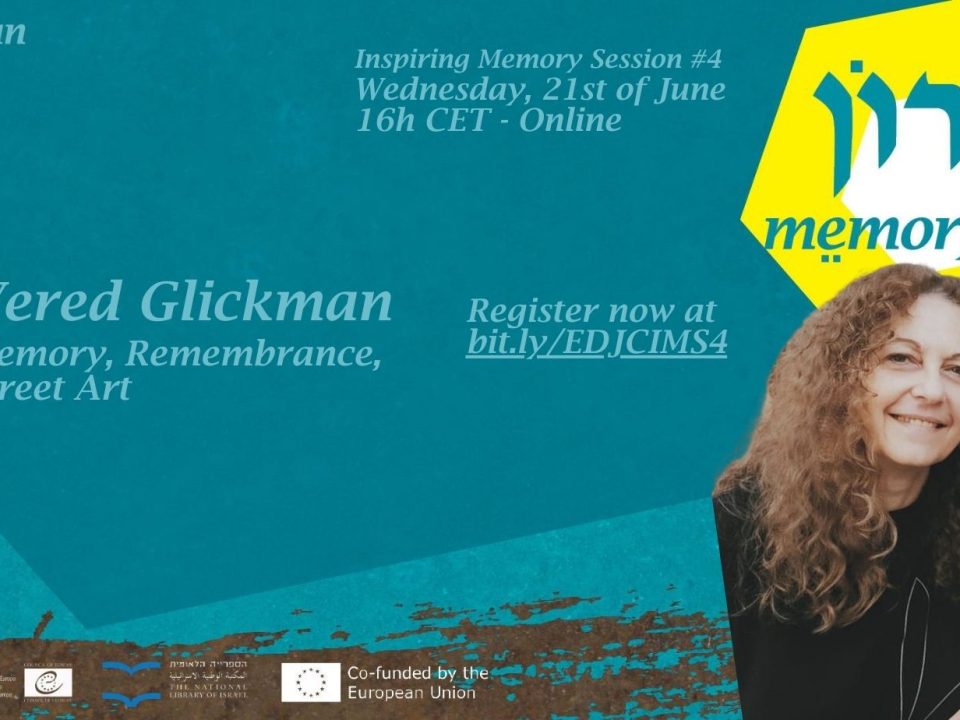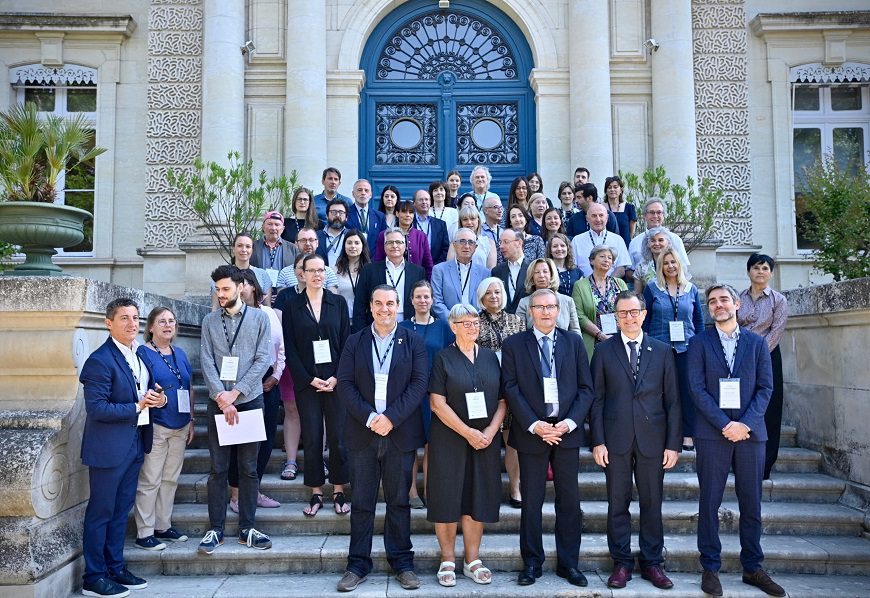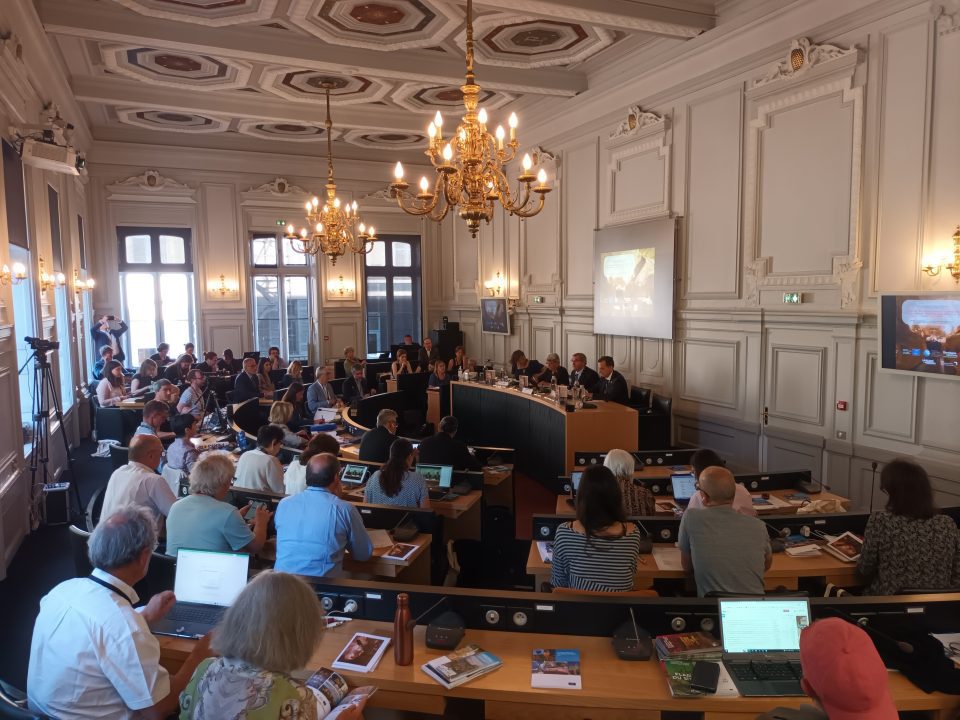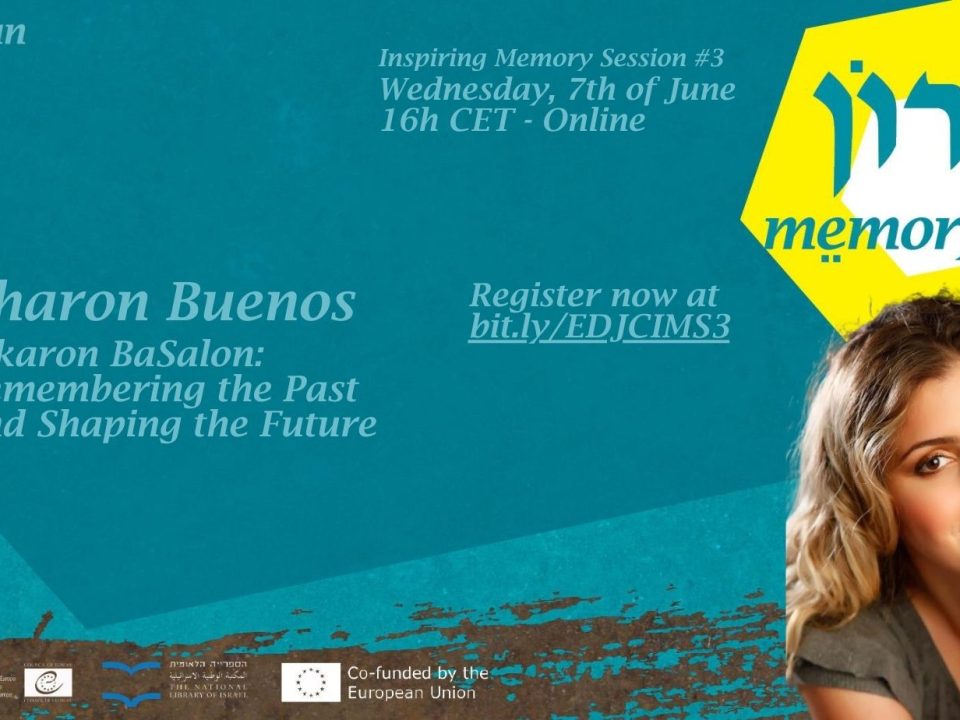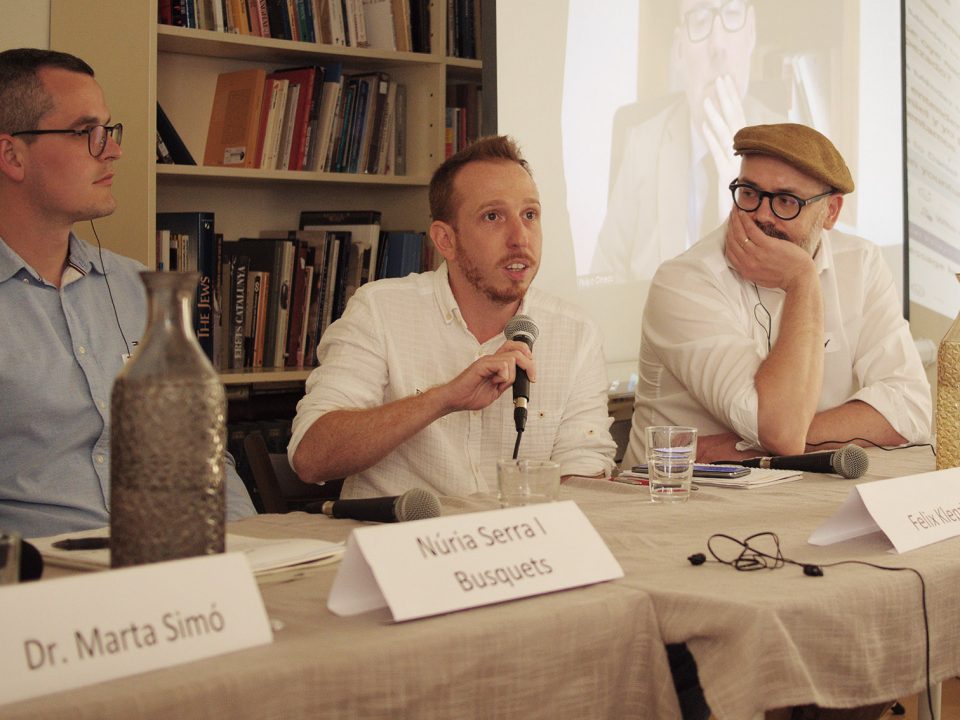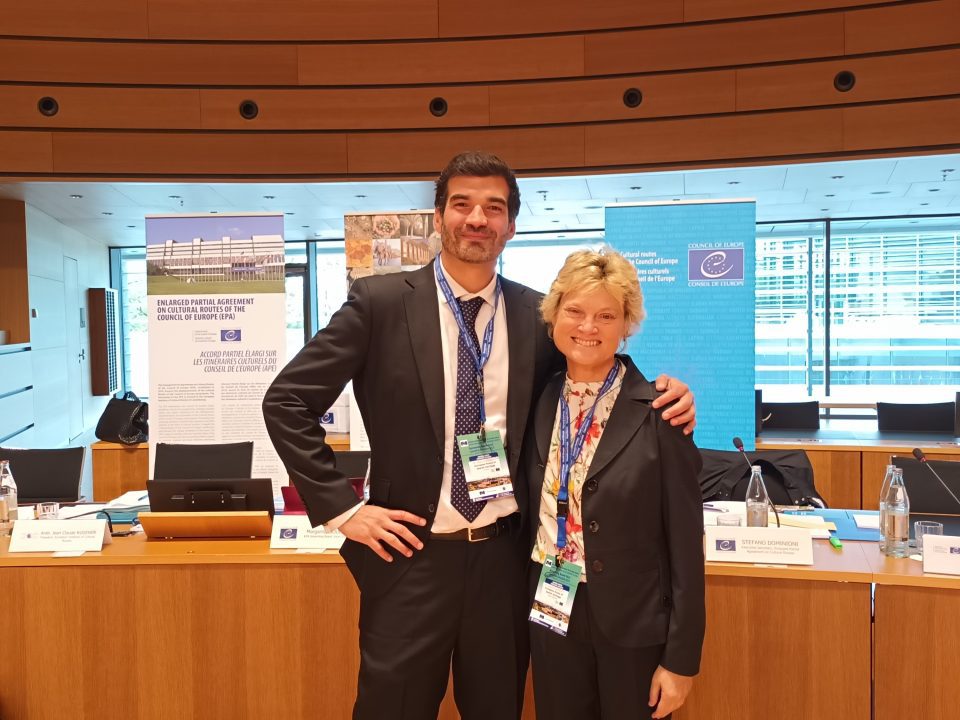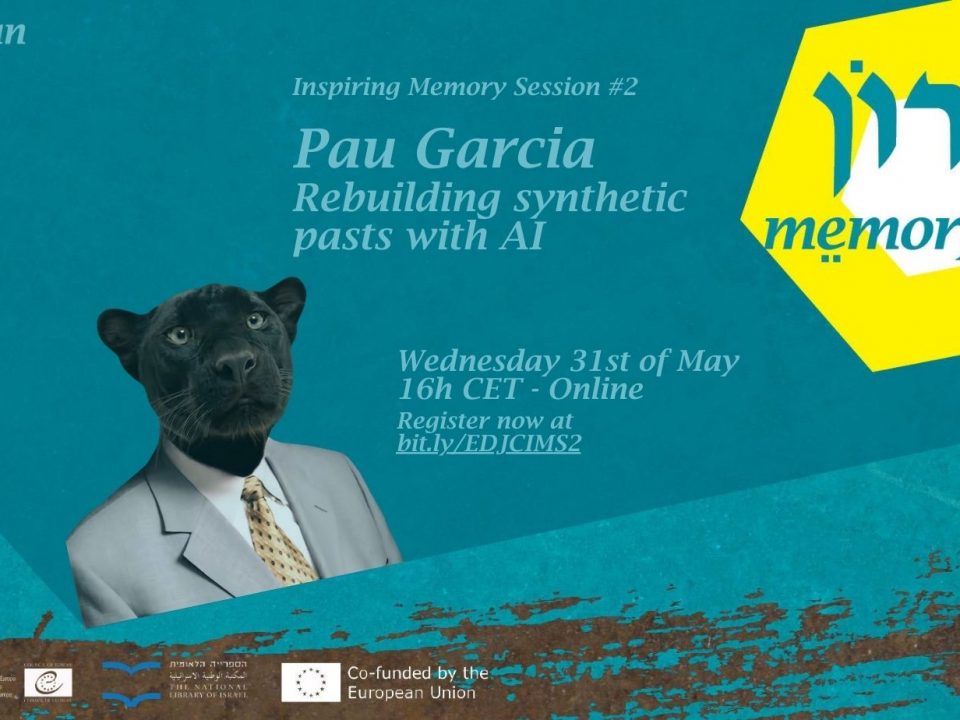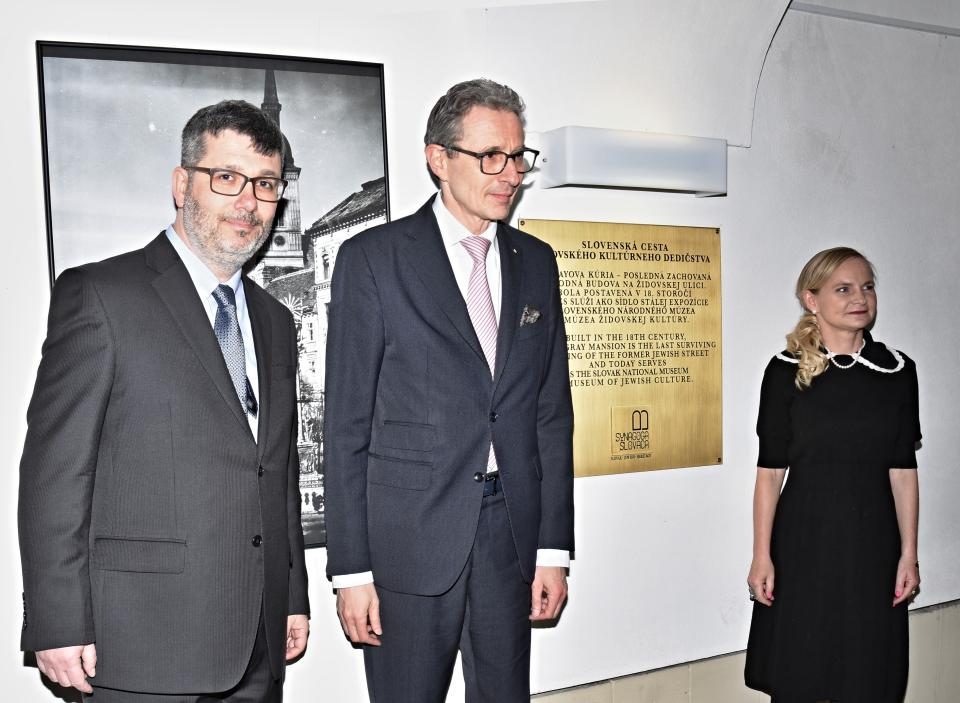- Filter by
- Categories
- Tags
- Authors
- Show all
- All
- AEPJ News
- Andalusia
- Austria
- Azerbaijan
- Balti
- Belarus
- Bendery
- Braunschweig
- Celle
- Chisinau
- EDJC old editions
- EDJC22
- EDJC23
- EDJC24
- EDJC25
- France
- Georgia
- Germany
- Girona
- Hannover
- Hildesheim
- Italy
- Izmir
- Lithuania
- Medieval Route
- Moldova
- National Route
- Orhei
- Padua
- Palaces, Villas and Country Houses
- Poland
- Regional Route
- Rhineland
- Rybnitsa
- Soroca
- Spain
- Thematic Route
- Tiraspol
- Turkey
- Ukraina
- Uncategorized
We are thrilled to announce the fourth and final installment of our Inspiring Memory Sessions, featuring Vered Glickman, with a captivating presentation titled “Memory, Remembrance, and Street Art.” Join us on Wednesday, June 21st at 4:00 PM CET for this engaging online session.
Allow us to introduce our esteemed guest speaker, Vered Glickman. Vered’s journey led her to Budapest in 2005, where she immersed herself in the rich cultural landscape. Born in Tel Aviv, she pursued her education at the High School of the Arts and later at Tel Aviv University, where she earned her PhD in the philosophy of mind. Vered’s passion for knowledge and sharing led her to teach courses on the History of Philosophy at Tel Aviv University and Haifa University.
Held in Périgueux-Montignac and Les Eyzies de Tayac in Dordogne, France, the 10th edition of the Training Academy on Cultural Routes has come to a close this afternoon. Marc Francesch Camps and Victor Sorenssen represented the AEPJ and the European Jewish Heritage Route.
The theme of the Training Academy 2023 was “Looking to the Future: visibility, cooperation and sustainability in the Cultural Routes of the Council of Europe.” During three days of intensive meetings, the Representatives of 34 Cultural Routes of the Council of Europe exchanged their experiences and proposals in the management of their respective Cultural Routes to further increase the notoriety of the programme, which brings together more than 3000 members from 60 countries.
Each of the themes, visibility, cooperation and sustainability, was presented by a working group that aimed to prepare the ground and present proposals to develop these crucial fields in heritage management.
The tenth edition of the Council of Europe’s Cultural Routes Training Academy, organized by Rock Art Trails, in cooperation with the Dordogne department and the European Institute of Cultural Routes, kicked off this morning, May 31, in Périgueux, France.
The program, as usual, combines different types of sessions, workshops and study visits. This year, there are three main themes that will be worked on by the representatives of the 35 cultural routes present: Cooperation, Visibilization and Sustainability.
On behalf of the AEPJ, Marc Francesch Camps, Project Manager of the European Route of Jewish Heritage, and Victor Sorenssen, AEPJ Director, represent our European network in Périgueux. In addition to actively participating in the sessions, AEPJ is the coordinator of the working group on cooperation.
The AEPJ is excited to announce the third “Inspiring Memory Session” of the European Days of Jewish Culture 2023, featuring Sharon Buenos, the Global Director of Zikaron BaSalon. The session, titled “Remembering the Past and Shaping the Future,” will take place on June 7th at 4:00 PM CET, and will be held online.
Sharon Buenos brings over 15 years of experience in leadership, marketing strategy development, and driving business growth in complex environments. As the Global Director of Zikaron BaSalon, she plays a pivotal role in this social initiative.
Zikaron BaSalon is an international movement that takes place on Yom Hashoah (Holocaust Remembrance Day) and other dates throughout the year. Sharon proposes to use their methodology to organise activities for the European Days of Jewish Culture 2023.
We are thrilled to announce that the results of the Jewish History Tours project, co-financed by the Connecting Europe Facility of the European Union, are now available and embedded within the pages of the European Routes of Jewish Heritage. This significant collaboration has connected Europeana, the European digital library, with the European Routes of Jewish Heritage certified by the Institute of Cultural Routes of the Council of Europe, highlighting the project’s achievements as a best practice example for other cultural routes under the Council of Europe.
Jewish History Tours is a groundbreaking initiative that harnesses the power of location-based storytelling to create captivating and immersive tours focusing on pan-European topics such as multiculturalism, persecution, and migration. These exceptional tours are meticulously crafted by local partners who possess in-depth knowledge of the local Jewish history and the sites that narrate those compelling stories.
BARCELONA—April 28, 2023
The Regional Seminar “Echoes of Reflexivity” held in Barcelona, aimed to create a safe space for discussing the role that Barcelona should occupy in the fight against antisemitism. Organized by CEJI and KigA e.V. of the ENCATE network, the seminar also proposed to promote discussion on contemporary history, recognize obstacles and best practices from a transversal and intersectional perspective, and advance the fight against antisemitism in various sectors, including education. The seminar emphasized critical self-awareness and the diversity of voices that live, fight against antisemitism, and promote Jewish life at the regional level in Catalonia and Spain.
During the second panel of the seminar, Federico Szarfer, Project Manager at the AEPJ, presented the European Days of Jewish Culture (EDJC) as a best practice in the fight against antisemitism.
LUXEMBOURG—May 10, 2023
The AEPJ has taken the last step in the process of renewal of the Council of Europe certification for the European Route of Jewish Heritage, through the hearing that took place at the European Convention Center in Luxembourg in front of the representatives of the Enlarged Partial Agreement of the Cultural Routes. On behalf of the AEPJ, Claudia De Benedetti, member of the Board of the AEPJ, and Victor Sorenssen, its Director, presented the European Routes of Jewish Heritage.
The presentation focused on the management model of the route, the European network that forms the route, its members, as well as its values and perspectives for future work. This hearing represents the last step in the renewal of the certification.
The AEPJ is proud to announce the second “Inspiring Memory Session” of the European Days of Jewish Culture 2023! The Inspiring Memory Sessions represent a series of four online sessions, through which experts in the field of memory and Jewish culture will present novel means of approaching memory in order to inspire organisers and coordinators when organizing activities in the context of the upcoming 2023 EDJC festival.
Titled “Rebuilding synthetic pasts with AI,” the talk will explore the potential use of generative artificial intelligence in reconstructing memories in various communities worldwide, and the implications this technology could have on our relationship with our visual heritage.
Our guest speaker, Pau Garcia, is a media designer and founder of Domestic Data Streamers, a studio that has been creating info-experiences and research for institutions such as the United Nations, Tate Modern, and the World Bank Organization since 2013.
BRATISLAVA, SLOVAKIA — At a ceremony held on May 4th at the Museum of Jewish Culture in Bratislava, the Slovak Jewish Heritage Route, which includes more than 25 sites throughout the country, was formally incorporated into the European Jewish Heritage Route, certified by the Council of Europe.
At the event, the President of the AEPJ, François Moyse, along with its Director, Victor Sorenssen, introduced the European network, the Cultural Routes program of the Council of Europe, and also reflected on the importance of this project, its potential, as well as the essential nature of cooperative work in the field of European Jewish heritage.
Addressing the audience were the following figures involved in the preservation of Jewish culture and heritage: Director of the Museum of Jewish Culture, Michal Vaněk, as well as Maroš Borsky, Director of the Jewish Cultural Institute and the Jewish Community Museum in Bratislava, Founder and Coordinator of the Slovak Jewish Heritage Route, represented in the AEPJ by the Jewish Heritage Foundation — Menorah.

